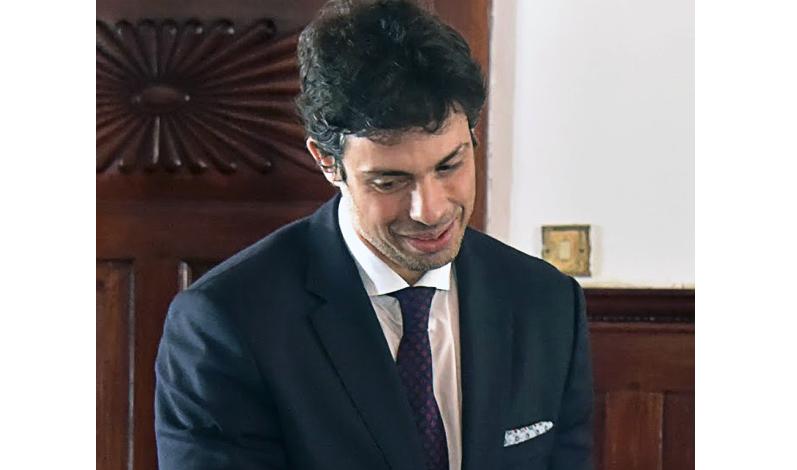Africa-Press – Mozambique. Jean Boustani, the senior official of the Abu Dhabi based Privinvest group, who is at the heart of Mozambique’s largest ever financial scandal, known as the case of the “hidden debts”, has said he “welcomes” the opportunity to testify at the trial.
In a press release, issued by a New York law firm, Boustani claimed that the judge, Efigenio Baptista, had in August “refused a request that I give evidence. I would have happily testified then if he had allowed it”.
But Boustani makes it clear that he has no intention of appearing in Mozambican in person and wants to give evidence by video-conference.
Boustani’s name has been mentioned repeatedly since the trial began on 22 August, as the Privinvest official in charge of making illicit payments to the defendants. The scale of the alleged bribes (or “success fees” as the defendants prefer to call them) was truly enormous – the prosecution says that Boustani gave a 33 million dollar bribe to Ndambi Guebuza, the oldest son of former president Armando Guebuza.
Guebuza Junior does not deny links with Boustani, but he claims they had nothing to do with bribes. He told the court that any payments made to him were under a “partnership” he had set up with Boustani. But he refused to give the court any information about this alleged partnership. What is known about the money sent by Privinvest for Guebuza’s use in South Africa is that it was used to buy real estate and luxury cars.
It was one of Guebuza’s lawyers, Alexandre Chivale, who first proposed calling Boustani as a witness. The prosecution and the judge eventually agreed, but the Mozambique Bar Association (OAM), which is assisting the Public Prosecutor’s Office, insisted, unsuccessfully, that Boustani should testify in person before the court.
Boustani is most unlikely to set foot in Mozambique since there is an international warrant out for his arrest, in connection with the role he played in the “hidden debts”. The term refers to the scheme, whereby three fraudulent, security-linked companies, Proindicus, Ematum (Mozambique Tuna Company) and MAM (Mozambique Asset Management), obtained over 2.2 billion dollars in loans from the banks Credit Suisse and VTB of Russia, on the basis of illegal loan guarantees issued by the government of the time, led by then President Armando Guebuza.
The scheme was largely orchestrated by Privinvest, and Privinvest was the main winner from the corrupt deal, since it became the sole contractor for the three companies. All the loan money was sent, not to the Maputo offices of the companies, but to Privinvest, which then provided Mozambique with vastly overpriced assets (such as fishing boats, patrol boats and radars). According to an independent audit of Proindicus, Ematum and MAM in 2017, Privinvest over-invoiced Mozambique by more than 700 million dollars.
The Mozambican Attorney-General’s Office (PGR) has repeatedly summoned Boustani to appear in Mozambique – first to provide information to the auditors from the company Kroll Associates, who were investigating the three companies, and then to appear before preliminary hearings into an additional case arising from the “hidden debts” in which he is one of the accused. Boustani ignored every summons sent by the PGR.
Much of Boustani’s press release is an attack on the PGR, accusing it of “lack of credibility” and “political motives”, though never explaining what these might be.
Boustani added that he was acquitted on all charges when he was tried in a New York Court in 2019 “including alleged violations of Mozambican laws”. This is a straightforward lie – Boustani was not tried under the Mozambican penal code, but under American law. The US prosecutors charged him with conspiracy to commit money laundering, wire fraud and securities fraud.
The American prosecutors could show, with a massive haul of intercepted emails and bank documentation, that Boustani was a key figure in massive bribery, paying off Credit Suisse bankers and Mozambican officials, including the then Finance Minister Manuel Chang.
Boustani made no attempt to deny the veracity of the documents. Instead he relied on clever lawyers arguing that, since the crimes did not take place in the United States, and Boustani had never set foot in the US before, he could not be guilty. This was a successful appeal to the jurors’ ignorance of US anti-corruption legislation, which does not depend on where the crime was committed.
A second lie in the press release is Boustani’s claim that he never stated he had corrupted any Mozambicans. In fact, a key claim in Boustani’s defence was that Mozambique is an entirely corrupt country, and that the only way to get business done there is through illicit payments.
Thus in the defence summing-up, one of Boustani’s lawyers, Randall Jackson, alleged that Mozambique had told investors “we are a corrupt country, corruption should be assumed in any transaction you are going to engage in. Don’t invest if that’s going to be a problem for you”.
Of course, no Mozambican government has ever made any such statement to investors.
During the New York trial, Boustani admitted to making payments to Mozambican officials – but he did not use the ugly word bribe, preferring to call the payments “fees”.
Prosecuting attorney Hiral Mehta dismissed this as just playing with words. “You can call them what you want. Success fees. Influence fees”, he said. “They are bribes. You pay government officials in connection with projects that they’re on? A CEO of the project you are working with? Or the guy signing the guarantees? It is bribes. Plain as day”.
Summing up the prosecution case, Mehta depicted Boustani as a Robin Hood in reverse. “Robin Hood stole from the rich and gave to the poor”, he said. “The defendant and his co-conspirators stole from one of the poorest nations on earth, and gave to the rich, themselves. That’s what they did when they stole more than 200 million dollars in bribes and kickbacks, when the defendant lined his own pockets”.
In a succinct summary of the case, Mehta said that Boustani “was engaged in a two billion dollar fraud and money laundering scheme involving the Proindicus and EMATUM and MAM deals. He did this by bribing Mozambican officials with over 100 million dollars to get the contract for Privinvest, paying more than 50 million dollars in kickbacks to bankers to get the loans approved, lying to banks and investors to get them to invest in the loans, causing almost 1.8 billion dollars in fraudulently obtained money to be wired from the US to Privinvest, and laundering millions of dollars using US banks”.
Boustani offered to provide Judge Baptista with transcripts of the New York trial, as if Mozambican judges can’t do their own homework. No doubt Baptista has already made a thorough study of the New York trial, since the transcripts happen to be readily available in Maputo.
Boustani concluded his press release with a call that President Filipe Nyusi should also testify. This is a demand that Privinvest raised earlier in connection with the proceedings in London, where the Mozambican state is sueing Privinvest. It also coincides with demands made by some of the lawyers for Guebuza Junior and other defendants.
Calling for Nyusi to appear in court is a useful distraction from the central role played by Privinvest and Boustani in the scandal.






